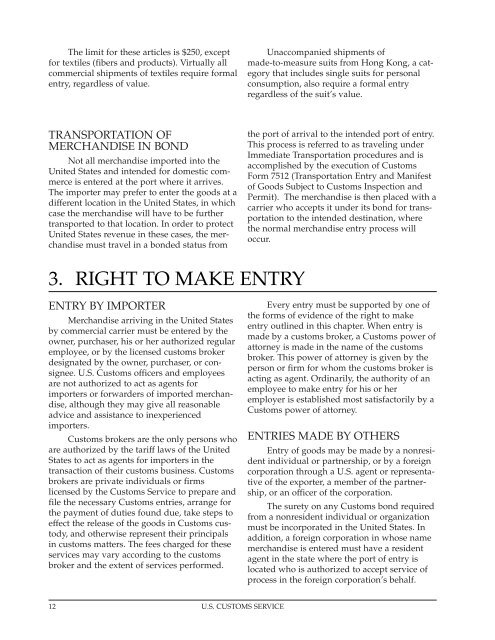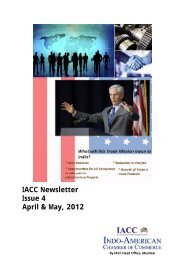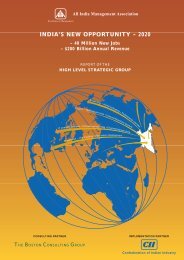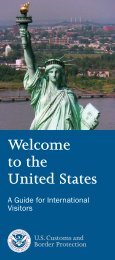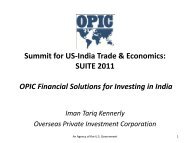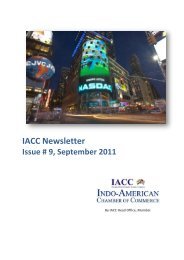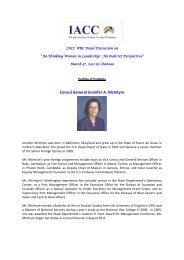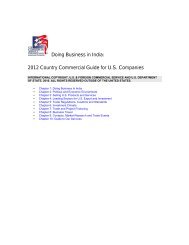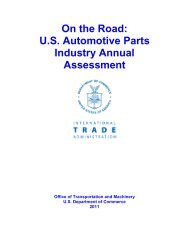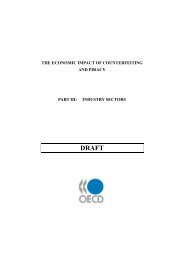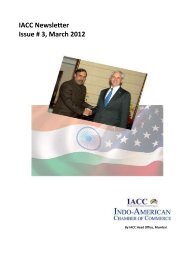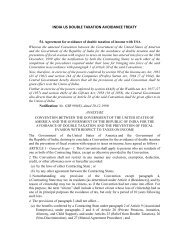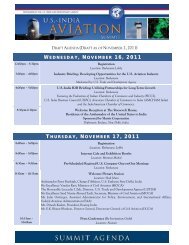Importing into the United States - Indo-American Chamber Of ...
Importing into the United States - Indo-American Chamber Of ...
Importing into the United States - Indo-American Chamber Of ...
Create successful ePaper yourself
Turn your PDF publications into a flip-book with our unique Google optimized e-Paper software.
The limit for <strong>the</strong>se articles is $250, except<br />
for textiles (fibers and products). Virtually all<br />
commercial shipments of textiles require formal<br />
entry, regardless of value.<br />
Unaccompanied shipments of<br />
made-to-measure suits from Hong Kong, a category<br />
that includes single suits for personal<br />
consumption, also require a formal entry<br />
regardless of <strong>the</strong> suit’s value.<br />
TRANSPORTATION OF<br />
MERCHANDISE IN BOND<br />
Not all merchandise imported <strong>into</strong> <strong>the</strong><br />
<strong>United</strong> <strong>States</strong> and intended for domestic commerce<br />
is entered at <strong>the</strong> port where it arrives.<br />
The importer may prefer to enter <strong>the</strong> goods at a<br />
different location in <strong>the</strong> <strong>United</strong> <strong>States</strong>, in which<br />
case <strong>the</strong> merchandise will have to be fur<strong>the</strong>r<br />
transported to that location. In order to protect<br />
<strong>United</strong> <strong>States</strong> revenue in <strong>the</strong>se cases, <strong>the</strong> merchandise<br />
must travel in a bonded status from<br />
<strong>the</strong> port of arrival to <strong>the</strong> intended port of entry.<br />
This process is referred to as traveling under<br />
Immediate Transportation procedures and is<br />
accomplished by <strong>the</strong> execution of Customs<br />
Form 7512 (Transportation Entry and Manifest<br />
of Goods Subject to Customs Inspection and<br />
Permit). The merchandise is <strong>the</strong>n placed with a<br />
carrier who accepts it under its bond for transportation<br />
to <strong>the</strong> intended destination, where<br />
<strong>the</strong> normal merchandise entry process will<br />
occur.<br />
3. RIGHT TO MAKE ENTRY<br />
ENTRY BY IMPORTER<br />
Merchandise arriving in <strong>the</strong> <strong>United</strong> <strong>States</strong><br />
by commercial carrier must be entered by <strong>the</strong><br />
owner, purchaser, his or her authorized regular<br />
employee, or by <strong>the</strong> licensed customs broker<br />
designated by <strong>the</strong> owner, purchaser, or consignee.<br />
U.S. Customs officers and employees<br />
are not authorized to act as agents for<br />
importers or forwarders of imported merchandise,<br />
although <strong>the</strong>y may give all reasonable<br />
advice and assistance to inexperienced<br />
importers.<br />
Customs brokers are <strong>the</strong> only persons who<br />
are authorized by <strong>the</strong> tariff laws of <strong>the</strong> <strong>United</strong><br />
<strong>States</strong> to act as agents for importers in <strong>the</strong><br />
transaction of <strong>the</strong>ir customs business. Customs<br />
brokers are private individuals or firms<br />
licensed by <strong>the</strong> Customs Service to prepare and<br />
file <strong>the</strong> necessary Customs entries, arrange for<br />
<strong>the</strong> payment of duties found due, take steps to<br />
effect <strong>the</strong> release of <strong>the</strong> goods in Customs custody,<br />
and o<strong>the</strong>rwise represent <strong>the</strong>ir principals<br />
in customs matters. The fees charged for <strong>the</strong>se<br />
services may vary according to <strong>the</strong> customs<br />
broker and <strong>the</strong> extent of services performed.<br />
Every entry must be supported by one of<br />
<strong>the</strong> forms of evidence of <strong>the</strong> right to make<br />
entry outlined in this chapter. When entry is<br />
made by a customs broker, a Customs power of<br />
attorney is made in <strong>the</strong> name of <strong>the</strong> customs<br />
broker. This power of attorney is given by <strong>the</strong><br />
person or firm for whom <strong>the</strong> customs broker is<br />
acting as agent. Ordinarily, <strong>the</strong> authority of an<br />
employee to make entry for his or her<br />
employer is established most satisfactorily by a<br />
Customs power of attorney.<br />
ENTRIES MADE BY OTHERS<br />
Entry of goods may be made by a nonresident<br />
individual or partnership, or by a foreign<br />
corporation through a U.S. agent or representative<br />
of <strong>the</strong> exporter, a member of <strong>the</strong> partnership,<br />
or an officer of <strong>the</strong> corporation.<br />
The surety on any Customs bond required<br />
from a nonresident individual or organization<br />
must be incorporated in <strong>the</strong> <strong>United</strong> <strong>States</strong>. In<br />
addition, a foreign corporation in whose name<br />
merchandise is entered must have a resident<br />
agent in <strong>the</strong> state where <strong>the</strong> port of entry is<br />
located who is authorized to accept service of<br />
process in <strong>the</strong> foreign corporation’s behalf.<br />
12 U.S. CUSTOMS SERVICE


